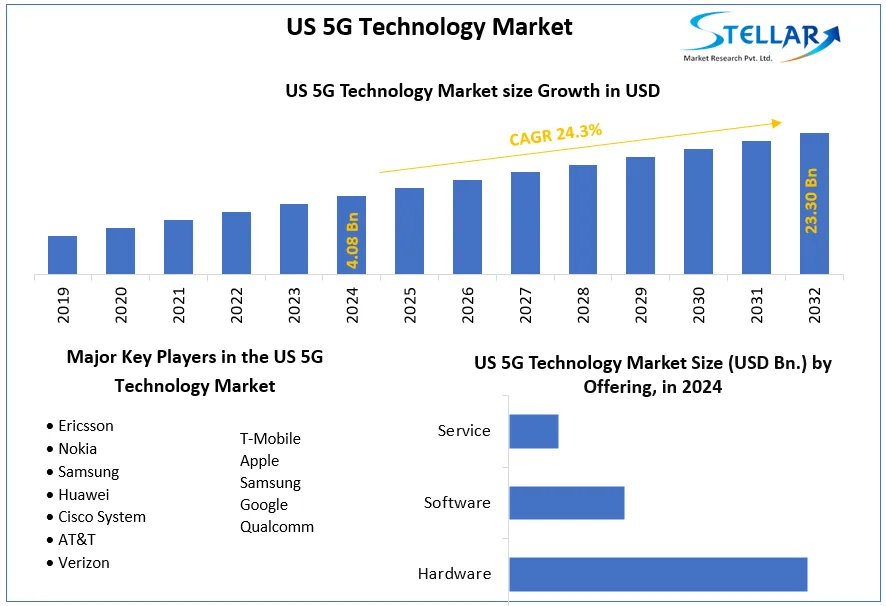US 5G Technology Market Size, Share, Growth Trends, Industry Analysis, Key Players, Investment Opportunities and Forecast (2025-2032)
The US 5G Technology Market size was valued at USD 4.08 Bn. in 2024 and the total US 5G Technology revenue is expected to grow at a CAGR of 24.3% from 2025 to 2032, reaching nearly USD 23.30 Bn.
Format : PDF | Report ID : SMR_1615
US 5G Technology Market Overview-
A 5G Technology is a dedicated cellular network for a specific organization, offering improved security, lower latency, and greater reliability. Unlike public 5G, these networks are owned and operated by the deploying organization. The rising use of 5G Technology is boosting the US market, creating opportunities for technology vendors and network equipment providers. Also, businesses deploy private 5G to optimize operations and leverage benefits such as customization for specific needs, supporting IoT, smart city initiatives, and critical communications.
The US 5G technology market is rapidly growing thanks to increased demand for faster data speeds and capacity. Government support with substantial funding and significant investments from major players contribute to this growth. Countrywide coverage varies by carrier and location. Urban areas generally have more extensive coverage. There are 2,358 5G device announcements, with 83.2% commercially available. The average download speed is 181 Mbps, significantly faster than 4G. Mobile network operators have invested billions in 5G infrastructure.
This report analyses the US 5G Technology market and covers trends, technological advancements, and potential disruptions that shape the market. It assesses market size, growth, economic factors, regulations, and commercial drivers. The competitive landscape is analyzed, highlighting differentiation among key operators and drawing on historical data, industry insights, and the report forecasts sector. The economic downturn prompted this analysis and revealed the US 5G Technology industry's resilience challenges. The report aims to equip stakeholders with crucial, concise information for informed decision-making in this dynamic sector. The targeted audiences include People with Healthcare professionals, Secondary Audiences, Government agencies, policymakers, and pharmaceutical companies in the US 5G Technology industry.

To get more Insights: Request Free Sample Report
Demand for High-Speed Connectivity to Drive the US 5G Technology Market
The US 5G Technology Market Transforming the connectivity landscape, the surge in demand for high-speed connectivity drives investments in 5G infrastructure, increasing networks and fostering job creation. Increased demand drives competition, sparking technological advancements for faster speeds and more efficient networks. Widespread 5G adoption unlocks innovative applications like AR/VR, autonomous vehicles, and smart cities. Improved connectivity improves productivity across sectors such as manufacturing, healthcare, and education. Consumers actively experience superior streaming, high-quality gaming, and faster downloads, elevating entertainment and media experiences.
The deployment of the US 5G technology industry raises several concerns that need attention. The digital divide widens as the cost of 5G devices and data plans may exclude low-income communities, limiting their access to its benefits. Additionally, the increased energy consumption of 5G networks raises environmental and sustainability concerns. The growth of connectivity also introduces cybersecurity threats, necessitating robust measures for protection. Despite scientific evidence refuting health concerns related to radiofrequency radiation from 5G, unfounded worries persist. The improved data processing associated with 5G brings forth privacy issues, emphasizing the need for strong data protection regulations and ethical practices to address these challenges effectively.
The rising demand for high-speed connectivity propels the US 5G technology market, but potential negative impacts require attention. Responsible development, affordable access, robust cybersecurity, and data privacy regulations can harness 5G opportunities while mitigating risks for an inclusive digital future. Consideration of individual perspectives, ongoing research, and informed policy decisions are vital.
Impact of Government Initiatives and Policies on the US 5G Technology Market
|
Initiative/Policy |
Impact |
|
Spectrum allocation |
- Provides necessary resources for network build-out |
|
R&D funding |
-Accelerates innovation and commercialization |
|
Rural infrastructure development |
- Grow 5G access to underserved areas |
|
Cybersecurity collaboration |
- Increases network efficiency and coverage |
|
National security concerns |
- Ensures national security and integrity |
|
Data privacy regulations |
- Protects user privacy and data security |
US 5G Technology Market Segment Analysis
Based on Connectivity, the eMBB (Enhanced Mobile Broadband) segment held the largest market share of about 70% in the US 5G Technology Market in 2024. According to the STELLAR analysis, the segment is further expected to grow at a CAGR of 24.5% during the forecast period. It stands out as the dominant segment within the US 5G Technology Market thanks to its rapid technological advancement and growing adoption of smart devices with data connectivity and integration.

The US 5G Technology Market eMBB revolutionizes user experience with speeds up to 20 Gbps, facilitating seamless streaming, immersive gaming, and rapid downloads. Its accelerated uploads and downloads enhance productivity, particularly in remote work settings. The technology also catalyzes economic growth by creating jobs, stimulating US 5G Technology industry investment, and bridging the digital divide in rural areas through improved connectivity.
The advent of the US 5G technology Market brings forth a range of challenges. The cost of 5G-compatible devices and data plans may deepen the digital divide, disproportionately affecting low-income communities. Additionally, the increasing energy consumption of 5G networks raises environmental and sustainability concerns. Growing connectivity also introduces new cybersecurity risks, necessitating robust measures. Despite scientific evidence debunking concerns, unfounded fears about radiofrequency radiation persist. Additionally, the increased data collection and processing associated with 5G gives rise to privacy issues, emphasizing the need for stringent data protection regulations to safeguard user privacy.
eMBB plays a pivotal role in early US 5G Technology market development, benefiting consumers, businesses, and the economy. To ensure sustainable and equitable growth, addressing negative impacts requires investment in infrastructure, affordable access, robust cybersecurity, and responsible data practices. Ongoing research aims to mitigate impacts, emphasizing public awareness and informed policy decisions for a responsible 5G future.
US 5G Technology Market Scope:
|
US 5G Technology Market |
|
|
Market Size in 2024 |
USD 4.08 Billion |
|
Market Size in 2032 |
USD 23.30 Billion |
|
CAGR (2025-2032) |
24.3 % |
|
Historic Data |
2019-2024 |
|
Base Year |
2024 |
|
Forecast Period |
2025-2032 |
|
Segment Scope
|
By Connectivity
|
|
By Offering
|
|
|
Application
|
|
|
End-User
|
|
Leading Key Players in the US 5G Technology Market
Frequently Asked Questions
Potential Complexity and Resource Requirements Associated with Implementing a Zero Trust Architecture are expected to be the major restraining factors for the US 5G Technology market growth.
The US 5G Technology Market size was valued at USD 4.08 Billion in 2024 and the total US 5G Technology revenue is expected to grow at a CAGR of 24.3% from 2025 to 2032, reaching nearly USD 23.30 Billion By 2032.
1. US 5G Technology Market Introduction
1.1 Study Assumption and Market Definition
1.2 Scope of the Study
1.3 Executive Summary
1.4 Emerging Technologies
1.5 Market Projections
1.6 Strategic Recommendations
2. US 5G Technology Market: Dynamics
2.1.1 Market Drivers
2.1.2 Market Restraints
2.1.3 Market Opportunities
2.1.4 Market Challenges
2.2 PORTER’s Five Forces Analysis
2.3 PESTLE Analysis
2.4 Regulatory Landscape
2.5 Analysis of Government Schemes and Initiatives for the US 5G Technology Industry
2.6 The Pandemic and Redefining of The US 5G Technology Industry Landscape
3. US 5G Technology Market: Market Size and Forecast by Segmentation (Value) (2024-2032)
3.1 US 5G Technology Market Size and Forecast, By Connectivity (2024-2032)
3.1.1 Enhanced Mobile Broadband (eMBB)
3.1.2 Ultra-Reliable Low Latency Communication (URLLC)
3.1.3 Massive Machine Type Communication (mMTC)
3.2 US 5G Technology Market Size and Forecast, By Offering (2024-2032)
3.2.1 Hardware
3.2.2 Software
3.2.3 Service
3.3 US 5G Technology Market Size and Forecast, By Application (2024-2032)
3.3.1 Connected Vehicles
3.3.2 Monitoring & Tracking
3.3.3 Automation
3.3.4 Smart Surveillance
3.3.5 VR & AR
3.3.6 Enhanced Video Services
3.4 US 5G Technology Market Size and Forecast, By End-User (2024-2032)
3.4.1 IT & Telcom Industry
3.4.2 Manufacturing
3.4.3 Automotive
3.4.4 Energy & Utilities
3.4.5 Transportation & Logistics
3.4.6 Healthcare
3.4.7 Media & entertainment
4. US 5G Technology Market: Competitive Landscape
4.1 STELLAR Competition Matrix
4.2 Competitive Landscape
4.3 Key Players Benchmarking
4.3.1 Company Name
4.3.2 Service Segment
4.3.3 End-user Segment
4.3.4 Revenue (2024)
4.3.5 Company Locations
4.4 Leading US 5G Technology Companies, by market capitalization
4.5 Market Structure
4.5.1 Market Leaders
4.5.2 Market Followers
4.5.3 Emerging Players
4.6 Mergers and Acquisitions Details
5. Company Profile: Key Players
5.1 Ericsson
5.1.1 Company Overview
5.1.2 Business Portfolio
5.1.3 Financial Overview
5.1.4 SWOT Analysis
5.1.5 Strategic Analysis
5.1.6 Scale of Operation (small, medium, and large)
5.1.7 Details on Partnership
5.1.8 Regulatory Accreditations and Certifications Received by Them
5.1.9 Awards Received by the Firm
5.1.10 Recent Developments
5.2 Nokia
5.3 Samsung
5.4 Huawei
5.5 Cisco System
5.6 AT&T
5.7 Verizon
5.8 T-Mobile
5.9 Apple
5.10 Samsung
5.11 Google
5.12 Qualcomm
6. Key Findings
7. Industry Recommendations
8. Terms and Glossary
9. US 5G Technology Market: Research Methodology
















